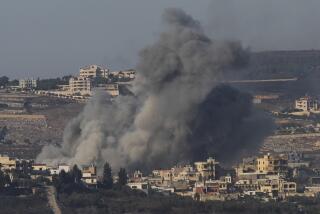Shamir Warns That Pullout Won’t Protect Settlements
JERUSALEM — Israeli Foreign Minister Yitzhak Shamir warned Tuesday that the planned pullout of the Israeli army from southern Lebanon does not guarantee security for Israel’s northern settlements, even as other government officials tried to reassure nervous residents that they will not be endangered.
Even officials who favor the withdrawal plan, however, warned of possible sectarian bloodshed among Lebanon’s warring Christian, Muslim and Druze communities.
Israel’s national unity Cabinet voted 16-6 Monday night in favor of a three-phase conclusion to the country’s 31-month old occupation of Lebanon. The first phase, involving evacuation of the port city of Sidon and redeployment about 15 miles south of current Israeli lines on the Awwali River, is to be completed within five weeks.
One of the six Cabinet members opposing the plan was Shamir, who is also alternate prime minister in the unity government. He said Tuesday that the resolution “didn’t contain the basic minimum of security arrangements for the Galilee settlements.”
Speaking in an interview with Israel radio, the Likud bloc leader also said he hopes that he and his party colleagues will in coming weeks “succeed to some extent in righting what was distorted last night.”
Prime Minister Shimon Peres, however, said, “I have no doubt that the government and the Israel Defense Forces will do their best to assure the safety of Galilee.”
Mayors of the northern towns were already asking for increased government funds Tuesday to repair bomb shelters and upgrade security fences and mine fields along border roads.
Before the 1982 invasion, Israel’s northern settlements were subjected to regular Katyusha rocket barrages and other terrorist attacks from Palestine Liberation Organization guerrillas in southern Lebanon. According to the Israeli army, nine Israeli civilians and three soldiers were killed in more than 100 terrorist acts across the Lebanese border between June, 1978, and April, 1981.
Meeting with northern mayors in Nahariya, six miles south of the Lebanese border on the Mediterranean coast, Lt. Gen. Moshe Levy, the army chief of staff, promised that the military will continue to fight terrorism even after the withdrawal.
Later, visiting high school students in Yokneam, west of Nazareth, Prime Minister Peres said Israel’s unilateral pullout decision came after unsuccessful efforts to negotiate a withdrawal plan with Lebanon. Even without one, Peres said, Israel will do its best “that our return home will be done in order and without bloodshed.”
More to Read
Sign up for Essential California
The most important California stories and recommendations in your inbox every morning.
You may occasionally receive promotional content from the Los Angeles Times.










